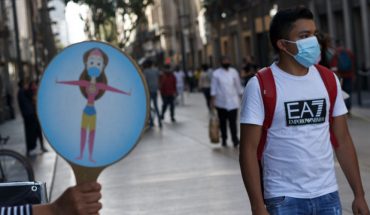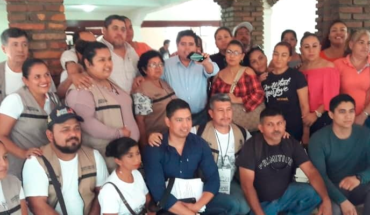Jacqueline, 22, who lives with a motor disability, was sentenced to four years and four months in prison for stealing soft drinks. For two years, she was deprived of her liberty at the Tepepan Women’s Center for Social Reintegration, in Mexico City, from where she left on June 30 after benefiting from the pre-release program promoted by the capital government.
Since she has no family networks to support her, the civil association Mujeres Unidas por la Libertad went for her and took her home. On Tuesday, July 5, Adriana Leyva, co-founder of the AC, accompanied the young woman to the Institute of Reintegration of the CDMX to follow up on her process in freedom, put her papers in order and see the possibility that she would access some economic support while she manages to insert herself into the labor market. However, the institute – without prior notification and despite the accompaniment it had – entered Jacky into a shelter.
Beatriz Maldonado, founder of Mujeres Unidas por la Libertad, claims that not only did Jacky be interned without explanation, but that in the shelter they did not even know what treatment to give her or why she was there, if she had any support network and that, as part of her pre-release agreement, she must go daily before the judge to sign for her freedom.
“It’s just because Adriana thinks of leaving her Women United for Freedom badge is that they talk to us about the shelter at night to ask us about Jacky, what she needed or how long she was going to be there,” Says Maldonado.
“The shelter tells us that the institute did not tell them anything more than ‘here we bring you this girl, bye’,” he claims.
Jacqueline’s case is in addition to that of Dulce, who after being pre-released by the capital authorities, without counting a reintegration plan, returned to live on the streets.
For two days, activists fought to rescue Jacky from the shelter. Without the presence or accompaniment of the Institute of Reintegration, they finally managed to take her out and take her with them to give her the accompaniment she requires.
Political Animal Sought the Institute for Social Reintegration to find out why it has not provided companionship and follow-up to the women beneficiaries of the pre-release program, but until the close of this edition there was no response.
“They give you your freedom and the Institute for Social Reintegration comes to tear down all the work of the head of government (Claudia Sheinbaum) and her lawyers, who are the ones who began to support legal issues in favor of people in vulnerable conditions (…) If they are not followed up as such, we are not really talking about social reintegration and then why does this institute exist,” Maldonado questions.
Urgent support once released
The founder of Mujeres Unidas por la Libertad explains that on Thursday, June 30, a few hours before Jacky was released, they received a call from the director of Tepepan to ask for help and take care of the young woman who was about to leave prison. According to Maldonado, the official told her that she had already spoken to other associations asking for support, but that they had refused and she did not want Jacky to leave without a support network.
“We went, now we received it and they gave us their documents,” he shares.
“She came out with the benefit and has to go sign, but because she is a girl who really does not understand, she has very little reasoning, and we brought her here to the house because she is a little girl who cannot be on the street alone, she cannot do her paperwork because she is not autonomous.”
During the four days she was with them, Jacky had no problem: she ate and slept well and talked about some aspects of her childhood that were helping them to think about where their family could be. He told them that he was born in Puebla, that his mother beat him since he was a child and that from the age of 11 he left his house to live on the street.
As part of her pre-release, she was taken to court to follow up and know how often she had to appear. There, Maldonado explains, the judge handed them a piece of paper that said Jacky could voluntarily go to a shelter. He also mentioned that he should go to the Reintegration Institute to do other procedures.
“They arrived (at the institute) around noon and it is assumed that they were just going to give them their kit, the help of Impulso Laboral (economic support) and perhaps link it elsewhere so that it could continue with workshops,” explains the activist.
Jacky and Adriana were waiting, but no one was telling them anything. A few hours later, they were only informed that the people had already arrived from the shelter to take the young woman away. They even explained to them that it was an open-door shelter, free transit, where nothing else went to sleep and in the day I was going out.
“How did they intend for Jacky to follow that routine? If they are not followed up, these women no longer follow the process of social reintegration and are apprehended again and that is what was going to happen with her, she was going to return to prison because she does not have the autonomy to carry out her procedures, “says Maldonado.
“The same authorities of the shelter report that Jacky was not going to be followed up on the legal issue, that someone took her to sign and returned her or that she took her to their psychological containment workshops or something like that, they do not have the capacity and especially the budget,” he adds.
Faced with this situation, the association drafted a letter that it presented to the judge in charge of Jacky’s process to inform him that he will assume all his care: there they will give her food and shelter, they will take her to sign when required and they will support her in her reintegration process.
Future work
Although Jacky returned with Mujeres Unidas por la Libertad, there is still a lot of work to be done: you have to process her birth certificate, find workshops in which she participates, seek adequate psychological care that evaluates and, where appropriate, prescribes the appropriate medication, but above all, look for real care options that prevent those who leave prison from being defenseless and no one helps them in their reintegration.
“We are requesting a space to turn it into a temporary trust shelter for women who leave the prison system and follow up on their social reintegration,” says Maldonado.
Therefore, the association seeks an audience with the head of government to present its idea, so that cases such as those of Jacky and Dulce are not repeated and those who require it have permanent accompaniment.
“We were supportive, we do not have a shelter, but our house is at Jacky’s disposal because no woman who leaves prison should be ignored by anyone, but less by the authorities,” says Maldonado.
What we do at Animal Político requires professional journalists, teamwork, dialogue with readers and something very important: independence. You can help us keep going. Be part of the team.
Subscribe to Animal Político, receive benefits and support free journalism.#YoSoyAnimal





